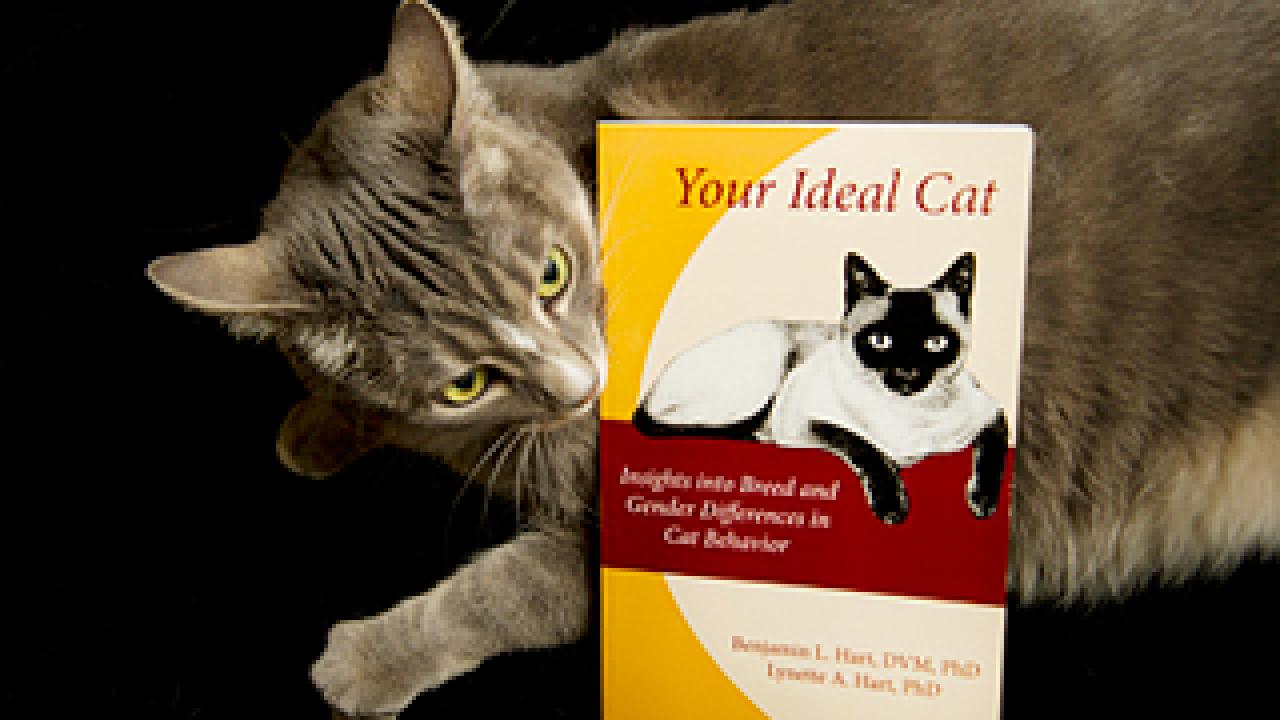Cats may have nine lives but humans have only one. Before you decide to share yours with a cat, you might want to check out which breed- and gender-related behaviors are most likely to accompany your feline housemate, suggest two University of California, Davis, animal behaviorists in their new book “Your Ideal Cat.”
“The kitten you choose today will grow into the cat that could be your companion for the next 15 to 20 years,” said veterinarian Benjamin Hart, the book’s co-author and distinguished professor emeritus in the UC Davis School of Veterinary Medicine. He noted that, all too often, kittens or adult cats are chosen because of appearance or happenstance, rather than according to the most compatible behavior traits.
Hart and co-author Lynette Hart, a professor of veterinary medicine, are experts in animal behavior and human-animal interactions. Their new book is the first to provide evidence-based comparisons of the behavioral characteristics of cat breeds and the genders, they say.
The Harts emphasize that interest in obtaining purebred kittens has grown, and people should know about some rather strong contrasts in behavior among the common breeds in areas such as affection, aggressiveness, fear or friendliness toward visitors, and even the tendency to engage in household urine marking.
It is equally important for people planning to adopt generic, nonpurebred cats to be aware of the range of possible behaviors and of major gender-based differences, they say.
“Our goal is to help prospective cat owners select the breed and gender best suited to their personality, family and home environment,” said Lynette Hart.
In “Your Ideal Cat,” the authors obtained expert rankings for 15 common purebred cat breeds according to 12 behavioral characteristics, all in comparison with the domestic shorthair and domestic longhair. The breed-specific information was developed by rankings gathered from 80 practicing veterinarians, who are members of the Association of Feline Practitioners.
The cat specialists ranked the increasingly popular ragdoll breed as the most affectionate, socially outgoing and least aggressive to cats or people. In contrast, another popular breed, the Bengal, was ranked the least affectionate, most aggressive and one of the most likely breeds — just behind the domestic shorthair — to urine mark. The most active cats — those that may treat the house as a three-dimensional forest — are the Abyssinian and Bengal breeds, with the Abyssinian also being the most playful.
Readers familiar with the “Zen master” Persian would likely not be surprised to find this breed ranked as least active and socially outgoing, while being the most difficult in litter box issues. And the Siamese was ranked the most vocal.
As for gender-based differences, there was a surprisingly strong consensus that neutered males are more affectionate and less aggressive than spayed females. On the other hand, males are most likely to urine mark in the house.
The Harts also give owners tips for welcoming a new cat into their homes. If possible, they suggest bringing home the litter box and scratching post that the kitten is already using, making the new home smell and feel familiar. And they offer advice for introducing the kitten to a home that already has one or more cats or a dog.
The book also contains advice on how to correct potential problem behaviors, and provides emerging scientific explanations for some of cats’ more endearing or interesting behaviors such as purring, yawning, “flipping out” on catnip and eating grass.
“Your Ideal Cat” contains 172 pages and was first published this month in paperback by Purdue University Press.
Benjamin Hart developed the first comprehensive teaching and research program in companion animal behavior at UC Davis’ William R. Pritchard Veterinary Medical Teaching Hospital and served as chief of the hospital’s behavior service. Lynette Hart studies human-animal interactions and communications, and was founding director of the Center for Animals in Society at UC Davis. Her research produced landmark studies on the socializing effects of animals for people with disabilities and on grief experienced by people following the death of a companion animal. The Harts also co-authored "The Perfect Puppy: How to Choose Your Dog by Its Behavior.”
Media Resources
Pat Bailey, Research news (emphasis: agricultural and nutritional sciences, and veterinary medicine), 530-219-9640, pjbailey@ucdavis.edu
Ben Hart, School of Veterinary Medicine, (530) 219-3298, blhart@ucdavis.edu
Lynette Hart, School of Veterinary Medicine, lahart@ucdavis.edu
